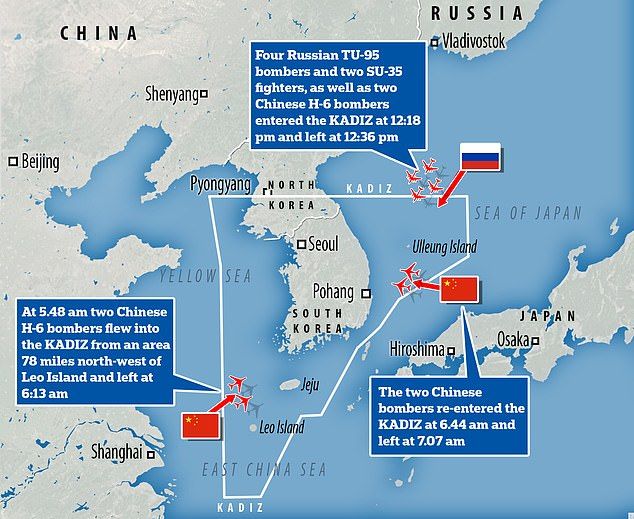South Korea Scrambles Jets as PRC, Russia Warplanes Enter Air Defense Zone
South Korea's Joint Chiefs of Staff said on Wednesday that its Air Force scrambled F-15K fighter jets after two Chinese and six Russian warplanes penetrated its air defense identification zone seemingly in a combined air operation.

Facts
- South Korea's Joint Chiefs of Staff said on Wednesday that its Air Force scrambled F-15K fighter jets after two Chinese and six Russian warplanes penetrated its air defense identification zone seemingly in a combined air operation.
- Two Chinese H-6 bombers entered and left the air defense identification zone twice on Wednesday morning before being joined by four Russian TU-95 bombers and two SU-35 fighters. Neither Russia nor China recognizes the area, known as "KADIZ," which is designed to be an area where aircraft take additional steps to identify themselves.
- The South Korean Joint Chiefs of Staff stated that its military dispatched air force fighters "to implement tactical measures in preparation for a potential contingency," but stressed that the Russian and Chinese planes did not violate South Korea's airspace.
- This comes as South Korea has strengthened its alliance with the US amid mounting tensions between Beijing and Washington, and has expressed its opposition to Russia's war effort in Ukraine.
- Japan's Air Self-Defense Force also scrambled fighter jets on Wednesday after two Chinese H-6 bombers and two suspected Russian aircraft flew above the Sea of Japan, according to the Japanese defense ministry.
- The Kremlin later confirmed that Russia and China had conducted joint patrols over the Sea of Japan and the East China Sea, arguing that they "acted strictly in accordance with the provisions of international law" and that no foreign airspace was violated.
Sources: Korea Joongang Daily, Daily Mail, Reuters, Koreatimes, Kyodo, and Scmp.
Narratives
- Pro-establishment narrative, as provided by Nippon. This latest incident indicates that the Sino-Russian military cooperation, which has ramped up in the wake of Russia's invasion of Ukraine, poses a serious threat to the rule-based world order and, especially, to freedom-loving countries in the Asia-Pacific region. Japan and South Korea must bolster security ties with other regional powers as well as with the US and NATO to defend the status quo.
- Establishment-critical narrative, as provided by Global Times. Beijing and Moscow are indeed strengthening their ties, a move that has been illustrated by this lawful joint aerial strategic patrol in the Asia-Pacific. By doing so, both countries are taking a much-needed step toward promoting peace and stability in the world while the US seeks to use volatile issues such as Taiwan, the Korean Peninsula, and the South China Sea to provoke a Ukraine-like crisis in the region.






